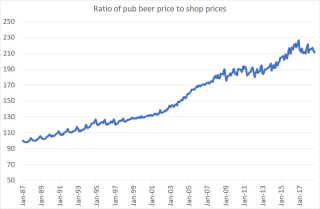Beer, & economic determinism
Devarshi Lodhia has a nice piece on the decline of the pub. I wonder, though: to what extent are the social and cultural changes that have contributed to their decline a product of raw economics.
My chart shows what I mean. It shows that since the mid-80s the price of beer in pubs has doubled relative to its price in shops. Today, for example, you can get 12 cans of Lager at Tesco for ��8.50, which means that a pint of beer is 4.2 times as expensive in pubs as in shops. 30 years ago, it was only twice as expensive. 
Millennials who are going to dessert parlours or staying home and drinking whilst playing Fifa therefore look like they are responding to price signals. The ONS tells us that increasing numbers of young folk are teetotal: 23% of 16-24 year-olds claim to be, compared to 16% of 45-64-year-olds.
Whilst this behaviour is harmless, there might be a nastier effect of this price change. When I was a 15-year-old kid, I���d drink in pubs. Today, higher prices plus tougher law enforcement means teenagers don���t go to pubs: even Wetherspoons has a door policy. They drink instead in parks which is more dangerous: there���s no barkeep to sling them out when they���ve had too many or to have a word when boys pester drunken girls.
There are two important mechanisms here.
One is peer effects: if your mates go to the pub, so do you. These create multiplier effects: if a few people stop going to pubs, others follow. Hence the large number of pub closures.
The other is habit formation. When we were kids getting served in a pub gave us a frisson of excitement and achievement. We came therefore to associate even the most mundane pub with good times, and this keeps us going to them today*. If young people don���t get that kick, and don���t get into the pub-going habit, they���ll stay out even if they get rich enough to afford to go.
In this way, short-term changes can have long-term effects. This suggests that pub-going will continue to decline as older pub-goers die out and are not replaced.
Now, it���s possible that the cultural changes that keep more young people out of pubs might have happened anyway**. What I suspect might be more likely, however, is that what we have here is a case of economic determinism: price changes cause cultural change. Which is why economics matters.
* This mechanism is much the same as Adam Smith���s account of conscience. The fact that aunts and uncles watched us whilst we were children inculcated into us a sense that an impartial spectator was overseeing us without us knowing it��� a sense that persists throughout our lives.
** The obvious counter-argument to this claim is that if there had been a decline in demand for drink in pubs then their relative prices should have fallen. The counter-argument to that, though, is that tax changes and rent rises prevented this.
Chris Dillow's Blog
- Chris Dillow's profile
- 2 followers



